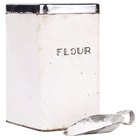kot63/iStock/GettyImages
Proper storage of rice and grains allows you to keep a long-term food supply on hand that's both safe and retains its quality. Purchasing most rice and grains in bulk also allows you to save money and spend less time running to the store to replenish your pantry staples. Moisture, heat and insects are the main enemies of rice and grain storage, but using the right storage methods prevents these problems.
Picking a Container
Food-grade containers with tight-fitting lids keep out moisture, air and pests so you can store the rice and grains for the longest period. Plastic buckets certified for food storage work best for holding large quantities of rice or grains, while smaller plastic jars work well if they are in a secure place where they can't fall. Metal storage containers made specifically for long-term storage are also suitable if they are rust-resistant.
Choosing a Location
The best storage location for rice and grains is out of direct sunlight, preferably in a dark basement or pantry area. Dry areas with low humidity prevent moisture damage to both the stored rice and grains and to the storage container. Rice and grains store best at temperatures near 70 degrees Fahrenheit. Higher temperatures can ruin the flavor and nutrition qualities of the food, but cooler temperatures don't have a major effect on long-term storage if the temperature remains above 32 F.
Preventing Problems
Pantry moths can lay eggs in rice and grains, which later hatch and ruin the stored food supply. A deep-freeze treatment before longer storage kills any eggs that are present so moths and insects don't become a problem later. Freeze the grains to zero degrees Fahrenheit and maintain the freezing temperatures for three days. Package in the airtight storage containers to prevent a new infestation.
Planning for the Long Term
Suitable storage length depends on the type and form of the rice or grain. Plain rice stores well for up to two years in a proper container kept in a suitable location. White flour and cornmeal store well for one year, while whole-wheat flour goes rancid quickly. It's best to use it within two weeks, although it may store suitably for six months to a year. Grinding your own whole wheat as needed allows for longer storage, because raw whole-wheat berries can store well for up to 25 years. You can store items made from grains, like dried pasta and cereal, for about six months when packaged in an airtight container.
Related Articles

How to Store Flours & Grains Without ...

How to Store Dry Beans & Rice for ...
How Long Can Flour Be Stored in Mylar ...

Does Flour Expire?

How to Store Clothes in Storage

Can I Freeze Wheat Berries?

Does Flour Spoil?

Do it Yourself Long-Term Rice Storage
How to Store Dry Beans & Rice for ...

How to Store Flour

How to Store Oat Bran

Does it Help to Keep Flour in the ...

How to Prevent Moths in Long-Term ...

About Weevils

How to Store Rice

How to Store Potatoes for the Long Term

How Do You Keep Bugs Out of Baking ...

How to Kill Moths in Wool

What Are the Dangers of Growing ...
How Long Before a Hard Boiled Egg Goes ...
References
Writer Bio
Jenny Harrington has been a freelance writer since 2006. Her published articles have appeared in various print and online publications. Previously, she owned her own business, selling handmade items online, wholesale and at crafts fairs. Harrington's specialties include small business information, crafting, decorating and gardening.